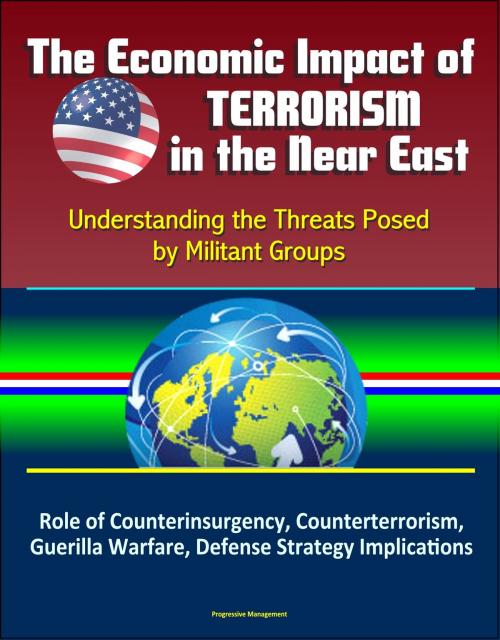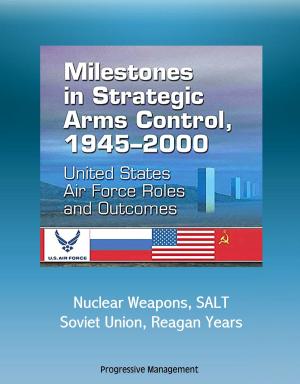The Economic Impact of Terrorism in the Near East: Understanding the Threats Posed by Militant Groups - Role of Counterinsurgency, Counterterrorism, Guerilla Warfare, Defense Strategy Implications
Nonfiction, Social & Cultural Studies, Political Science| Author: | Progressive Management | ISBN: | 9781370333981 |
| Publisher: | Progressive Management | Publication: | February 11, 2017 |
| Imprint: | Smashwords Edition | Language: | English |
| Author: | Progressive Management |
| ISBN: | 9781370333981 |
| Publisher: | Progressive Management |
| Publication: | February 11, 2017 |
| Imprint: | Smashwords Edition |
| Language: | English |
This excellent report has been professionally converted for accurate flowing-text e-book format reproduction. How successful are terrorist attacks in inflicting economic harm on states? The small body of work that has explored this question finds that while domestic terrorism is generally ineffective, transnational terrorism does reduce economic growth in some regions. Despite being a major center of terrorism, the Near East region has not been empirically tested in this way. This paper investigates the effect of domestic and transnational terrorism on macroeconomic growth for the eighteen countries in the Near East from 1970-2012. The findings indicate that neither form of terrorism has significantly affected economic growth, however, internal conflicts and external wars have both greatly limited growth. These findings have implications for how states allocate their scarce resources to formulate efficient defense strategies. Terrorist groups are not monolithic in nature; while some groups conduct terrorist attacks almost exclusively, others use terrorism as a part of a larger strategy that also incorporates guerilla warfare and sometimes even conventional military operations. More traditional terrorist groups, which often have universal or global objectives, can be effectively targeted using counterterrorism strategies. Groups that are more local in nature, and who use terrorism in conjunction with other tactics, present a much greater threat to a state's economy and political stability. These groups are better targeted using a counterinsurgency framework, which focuses more resources towards resolving the underlying causes of the conflict.
There are a number of mechanisms through which terrorism can impose economic harm on a targeted nation. First, the threat of terrorism can lead to a reduction in foreign direct investment as investors divert their capital to other areas. This loss of investment has the potential to reduce economic growth, particularly in developing nations. Second, terrorist attacks can destroy key infrastructure needed to facilitate the exchange of goods and services throughout an economy. Although the associated losses are normally temporary, additional resources must be expended in order to repair or rebuild the infrastructure. Third, a terrorist campaign can reduce trade as spillover costs among neighboring countries discourage economic exchange with the terror-ridden country. Fourth, in response to terrorism events, nations often increase their expenditures on defense and security measures, which can crowd out investment in other areas. Also, resources spent on security cannot be devoted to other activities that facilitate long-run economic growth, such as conducting research and development or acquiring new technologies. Fifth, the uncertainty brought about by terrorism can adversely impact businesses by requiring them to pay higher wages to their employees, increasing insurance premiums, and necessitating additional expenditures on security. These excess costs decrease business profits and lower economic growth.
Following the terrorist attacks of September 11th, 2001 researchers have sought to better understand the macroeconomic consequences of terrorism. Despite a terrorist organization's intentions to inflict economic harm on a nation, the extent to which terrorist attacks are successful in doing so is not clear. Furthermore, various economies will respond differently based upon their characteristics. A nation with a large gross domestic product (GDP) would likely see a smaller impact from a terrorist event because the fraction of the economy affected by the attack would be relatively small.
This excellent report has been professionally converted for accurate flowing-text e-book format reproduction. How successful are terrorist attacks in inflicting economic harm on states? The small body of work that has explored this question finds that while domestic terrorism is generally ineffective, transnational terrorism does reduce economic growth in some regions. Despite being a major center of terrorism, the Near East region has not been empirically tested in this way. This paper investigates the effect of domestic and transnational terrorism on macroeconomic growth for the eighteen countries in the Near East from 1970-2012. The findings indicate that neither form of terrorism has significantly affected economic growth, however, internal conflicts and external wars have both greatly limited growth. These findings have implications for how states allocate their scarce resources to formulate efficient defense strategies. Terrorist groups are not monolithic in nature; while some groups conduct terrorist attacks almost exclusively, others use terrorism as a part of a larger strategy that also incorporates guerilla warfare and sometimes even conventional military operations. More traditional terrorist groups, which often have universal or global objectives, can be effectively targeted using counterterrorism strategies. Groups that are more local in nature, and who use terrorism in conjunction with other tactics, present a much greater threat to a state's economy and political stability. These groups are better targeted using a counterinsurgency framework, which focuses more resources towards resolving the underlying causes of the conflict.
There are a number of mechanisms through which terrorism can impose economic harm on a targeted nation. First, the threat of terrorism can lead to a reduction in foreign direct investment as investors divert their capital to other areas. This loss of investment has the potential to reduce economic growth, particularly in developing nations. Second, terrorist attacks can destroy key infrastructure needed to facilitate the exchange of goods and services throughout an economy. Although the associated losses are normally temporary, additional resources must be expended in order to repair or rebuild the infrastructure. Third, a terrorist campaign can reduce trade as spillover costs among neighboring countries discourage economic exchange with the terror-ridden country. Fourth, in response to terrorism events, nations often increase their expenditures on defense and security measures, which can crowd out investment in other areas. Also, resources spent on security cannot be devoted to other activities that facilitate long-run economic growth, such as conducting research and development or acquiring new technologies. Fifth, the uncertainty brought about by terrorism can adversely impact businesses by requiring them to pay higher wages to their employees, increasing insurance premiums, and necessitating additional expenditures on security. These excess costs decrease business profits and lower economic growth.
Following the terrorist attacks of September 11th, 2001 researchers have sought to better understand the macroeconomic consequences of terrorism. Despite a terrorist organization's intentions to inflict economic harm on a nation, the extent to which terrorist attacks are successful in doing so is not clear. Furthermore, various economies will respond differently based upon their characteristics. A nation with a large gross domestic product (GDP) would likely see a smaller impact from a terrorist event because the fraction of the economy affected by the attack would be relatively small.















